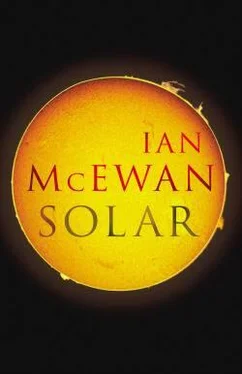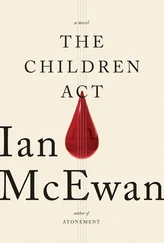Despite all this truth-telling, the interviews were stressful, and the very first terrified him, for he could not be sure that someone had not seen him arriving at the house at ten and leaving forty-five minutes later. But terror was easily translated into an appearance of understandable stress. Matters eased during the remaining three sessions, all of which occurred after Tarpin’s arrest, but still, a fair degree of concentration was required. One week into the affair, Beard read in a newspaper – the predictable storm was raging, photographers were by the garden gate all day and much of the night – that no one had seen Tarpin on the morning of Aldous’s death. The heavy rain caused the builder to stay alone at home, depriving him of workmates and an alibi. That at least was refreshing. And so were the leaks from the police station to the press about Tarpin’s threatening postcard to Aldous, and the two phone calls that the young man had so wisely recorded. Beard’s final two interviews were mostly formalities, a tidying up of loose ends, so he was smilingly assured. It seemed clear enough, the police had their man. Beard signed his statement with a flourish.
Out at the Centre, however, Jock Braby was not so pleased. Beard went out to talk to him on the eighth day, straight after his third interview. He decided to drive because he preferred not to be followed onto the Reading train by the press. He was the object of great interest, having been cast as the hapless victim, the unworldly fool and dreamer with a fast wife beyond his control. There was a gaggle of photographers and reporters by the Centre’s barrier gates, and the security guards in their peaked caps, deeply impressed and sympathetic, lined up to give Beard their smartest salute as he drove through.
The two men drank tea in Braby’s office and Beard told him the whole story, down to the last detail, just as he had told it to the police.
Braby frowned, and frowned deeper, and gestured through his wall in the approximate direction of the main gates. ‘This isn’t good,’ he said more than twice, and began a long, opaque speech with hesitations and fumbling repetitions, and allusions to ‘funding’ and ‘reputation’, to ‘standing back’ and being ‘helpful’, and it became clear, or less unclear, after ten minutes that what he seemed to want was for Beard to resign, and only after two references to ‘the domestic front’ was it apparent that Mrs Braby was being invoked and that what was at stake was the knighthood and a degree of hearthside tranquillity. The man was, in theory, his junior and he was asking Beard to step down! Must it be assumed to be his fault, when one of his wife’s lovers killed another? But he kept his indignation well hidden and pretended to misunderstand.
‘Jock, whatever they’re whispering around the Cabinet Office at the moment, you’d be a bloody fool to resign. I’ll put in a good word. Keep your head down for a month or two and it will all go quiet again, you’ll see.’
In the circumstances, there was nothing for Braby to do but change the subject. They talked about Aldous, and found common ground in their dislike of him, while acknowledging the loss to the Centre. The police had gone through his cubicle and found nothing of interest relating to the case. A few personal effects had already been dispatched to the distraught father in Norfolk.
Braby said, ‘Michael, there was a file marked strictly for your eyes only. I had a good look. A lot of inorganic chemistry, and maths, ramblings, I’d say, and probably done in company time.’ He handed across a heavy folder. Beard took it, then stood to indicate the conversation was at an end. He was, after all, still the Chief.
Braby walked him along the corridor a little way. ‘I suppose we can honour his memory by developing his micro wind-turbine thingy. We’re all deeply committed.’
‘Oh yes, that,’ Beard said. ‘Of course. It will be his monument.’
They shook hands and parted.
And what of the marriage? After the body had been taken away, the forensic team withdrawn, the house declared no longer a crime scene, the press gone from the garden gate, at least until Tarpin’s trial, and some workmen hired by Beard came in with sander and polisher to remove all traces of the deep floorboard stain in the sitting room, Michael and Patrice returned from their respective lodgings to the marital home in order to empty it of their belongings and put it up for sale and go their separate ways. These were gusty, sunlit days in March, with winds so strong that the unmown grass was flattened silver sides up, and last year’s unswept leaves were piled in drifts against the mossy garden walls. It was weather of a bracing, purifying sort, for Beard at least.
True to his plan, and to Patrice’s satisfaction, he renounced any claim to the contents of the house – the list was oppressively long – and took only his books, clothes and a few personal belongings. Not only was he going to shed weight, and become trim and fit, he was intent on a slimmed-down life in the plain apartment he had yet to find. A simplifying factor was, of course, the fading of his love for, or obsession with, his wife. In one of their rare exchanges, he told her that her love life had brought nothing but destruction, and grief to an ailing father in Swaffham, and deprived the country of one of its most promising scientists. It amazed Beard how convinced he himself now was by the narrative everyone believed, and how easily he could summon the appropriate memories and emotions. Was it not true that if Patrice had not had an affair with Tom Aldous, he would still be alive today? And was it not also true that Tarpin would probably have wanted Aldous dead? There was no pretence on Beard’s part, he was genuinely aggrieved by what Tarpin had done, and it was right to hold Patrice to account. She owed her husband an apology.
Typically, she did not see it that way. She was in deep mourning for what she now believed was the love of her life. Her apologies were due only to the man who could not hear them. She was miserable with guilt at bringing Tarpin into Aldous’s life, for failing to protect the younger man, for not taking the threats more seriously. In addition, the burdens of packing and storage were all hers, since she wanted the stuff, which happened to include the rug and coffee table that had murdered her lover. She moved about the house in silent sorrow, working through her lists with numb efficiency. Her husband was at best an irrelevance, though he suspected that she hated him now for indefinable reasons, or for no good reason at all. Her silence, he decided, was preferable to the lethal cheerfulness with which she had wanted to annihilate him during her Tarpin days.
He was not inclined to help her sort through the goods that were now hers, but he made himself useful in other ways. Since there was nothing legally at issue between them, he suggested they share a lawyer. He knew a good one. Beard also knew the right agent to sell their house. He was well practised in these kinds of arrangements. He moved out first, to a rented basement flat in Dorset Square, on the north side of the Marylebone Road, and it was there, three months later, sprawled on a stained floral sofa that smelled like a dog, that he began to read the folder marked ‘Strictly for the eyes of Professor M. Beard’. It was turgid stuff, organic as well as inorganic chemistry, interwoven with some quantum informational concepts and certain more obscure subsections of the Conflation. These elements edged towards a theoretical description of the energy exchange in photosynthesis. Presumably, the intention, at some point further into the file, was to suggest how the process might be imitated and adapted somehow, but Beard’s attention began to flag, first because the material was impenetrable, second because he needed to buy a flat, and then, five months to the day after Tom Aldous’s death, the trial of Rodney Tarpin began.
Читать дальше












